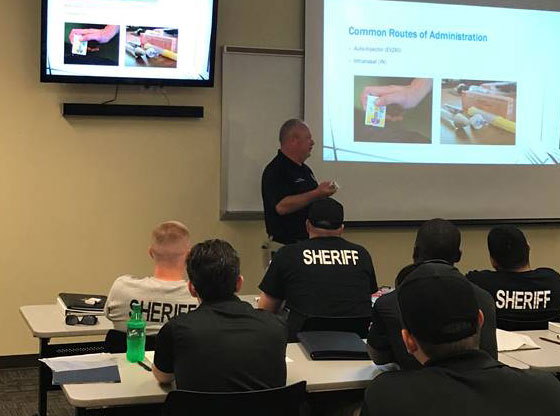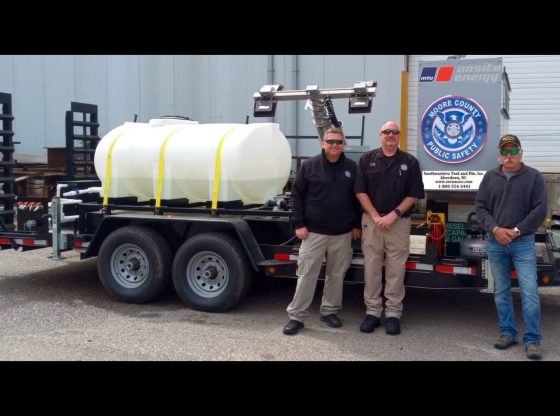Moore County Sheriff’s deputies received training on Narcan from Scot Brooks, the Deputy Director of EMS Public Safety. The training included overdose signs, symptoms, the legal aspects of administering the life-saving drug and its benefits in combating the opioid epidemic, according to a news release from Sheriff Neil Godfrey.
 Narcan is the brand name of the medical drug Naloxone, which essentially serves as an antidote to opioid overdose. When someone takes too much of an opioid, their breathing slows down and can stop completely. Narcan blocks the effects of opioids and reverses overdose symptoms. It works on overdoses of heroin and prescription painkillers such as oxycodone, hydrocodone, and morphine.
Narcan is the brand name of the medical drug Naloxone, which essentially serves as an antidote to opioid overdose. When someone takes too much of an opioid, their breathing slows down and can stop completely. Narcan blocks the effects of opioids and reverses overdose symptoms. It works on overdoses of heroin and prescription painkillers such as oxycodone, hydrocodone, and morphine.
According to the Centers for Disease Control and Prevention, more than half a million people died from drug overdoses between 2000 and 2016.
In 2016, medication and drug overdoses claimed more than 1,200 lives in North Carolina, up from just 300 per year around the turn of the millennium. No other cause of death has skyrocketed as sharply. To put the increase in perspective, there are now more than twice as many annual deaths from drug overdoses than murders in North Carolina.
According to Sheriff Godfrey, “the intent of our deputies carrying Narcan is a matter of life and death. Our intent is to reduce the time between the opioid overdose symptoms and effective intervention. Tragically, many victims do not receive timely medical attention. Our deputies are usually first on scene and can quickly administer Narcan and save a life. It’s one more this we can do to help our community.”
Recently Sheriff’s deputies have transitioned to an outer vest carrier increasing officer safety by allowing deputies to effectively carry more life-saving equipment on their person enabling the deputy to have immediate access to the equipment. This equipment includes tourniquets and Narcan drug overdose kits. Just as the Moore County Sheriff Deputies are carrying Narcan, Governor Cooper has signed House Bill 243, the STOP Act, into law.
 “Opioid addiction and overdose have ravaged the physical and mental health of thousands of North Carolinians, hurting our people and our economy, and we’re taking action to fight it,” Cooper said. “With this legislation and the new State Opioid Action Plan, we’re taking important first steps to stem the opioid epidemic.”
“Opioid addiction and overdose have ravaged the physical and mental health of thousands of North Carolinians, hurting our people and our economy, and we’re taking action to fight it,” Cooper said. “With this legislation and the new State Opioid Action Plan, we’re taking important first steps to stem the opioid epidemic.”
The STOP Act, which stands for the Strengthen Opioid Misuse Prevention Act, seeks to help curb epidemic levels of opioid drug addiction and overdose in North Carolina through several key provisions, including:
Strengthening oversight and tightening supervision on opioid prescriptions;
Requiring prescribers and pharmacies to check the prescription database before prescribing opioids to patients;
Instituting a five-day limit on initial prescriptions for acute pain, with exemptions for chronic pain, cancer care, palliative care, hospice care, or medication-assisted treatment for substance use disorders;
Saving lives through increased access to naloxone which can reverse opioid overdose;
Allowing local governments to support needle exchange programs.
The STOP Act was passed unanimously by both chambers of the North Carolina General Assembly. At the bill signing, Gov. Cooper was joined by a bipartisan group of bill sponsors, Attorney General Josh Stein, Health and Human Services Secretary Mandy Cohen, Public Safety Secretary Erik Hooks, law enforcement leaders, and advocates for substance abuse treatment and recovery from across North Carolina.
*photo courtesy of moore county sheriff’s office
*nc.gov


















